Chinese Jujube Tea, or Chinese red date tea, is a traditional tea recipe that is popular in China, Korea & other parts of Asia as it is believed to be very good for your health and blood circulation. It can be steeped alone or with cinnamon, honey, rose, dried longan or red ginseng.
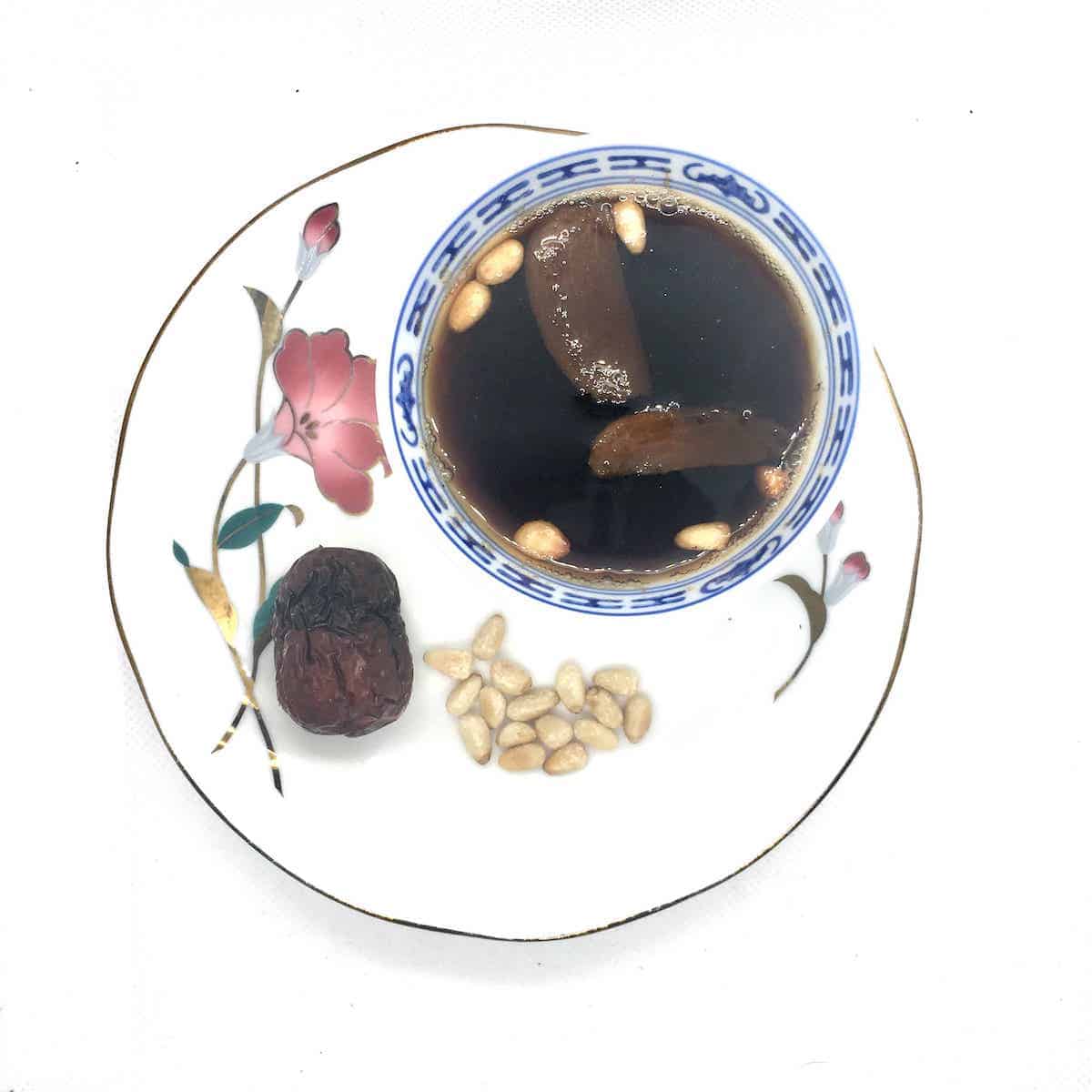
Jump to:
Why Make This
- Chinese Red Dates are good for you: not only can it sweeten food naturally, this popular Chiense herbal tea has been extolled by Traditional Chinese Medicine as a healthy food that is good for your immune system for centuries. Recent scientific research has found evidence to back these claims too! (See Health Benefits below.)
- Jujube Tea is 1 of the easiest way to add jujubes to your diet (and tasty too): It is pretty much a dump and simmer recipe!
What are Jujubes?
Jujube dates are a big part of Chinese cooking and can be eaten as fresh fruit or dried fruit.
They belong to the Rhamnaceae buckthorn family and are also known as Ziziphus jujuba (scientific name) or Chinese red dates (hong zao 红枣).
Chinese red dates are used in many recipes. These range from drinks such as honey jujube tea (Korean Dae Chu Cha (대추차)), Chinese red date tea (Hong Zao Cha 红枣茶), osmanthus tea, dried longan tea and goji berry tea to savory dishes such as abalone chicken jook, Ginseng Chicken Soup and black Silkie Chicken Soup.
You can even use jujubes to naturally sweeten desserts such as Sea Coconut Tong Sui!
Note: it is not related to the jojoba plant!
Health Benefits
Women are encouraged to drink this herbal tea when on their period as it supposedly warms the body and thus helps with cramps. This drink is thus a key component of the Chinese postpartum or confinement diet.
Recently, there has also been scientific studies done to support some of these traditional health benefits of jujubes, e.g. that jujube tea helps with insomnia (Click the respective links to see the scientific papers):
- Jujubes contain a variety of bioactive components, polyphenols, amino acids, nucleotides, fatty acids, dietary fiber, alkaloids, and other nutrients. These have physiological functions including anticancer, antioxidant, anti-inflammatory, anti-hyperlipidemic, anti-hyperglycemic, immunoregulatory, hypoglycemic, lipid-lowering, neuroprotective, neuroprotective, sedative, and antiviral functions.
- Jujubes are a good source of beneficial acids such as ascorbic acid, triterpenic acids, phenolic acids, amino acids, saponins, cerebrosides, flavonoids, and mineral constituents. These can help to suppress different diseases, exerting the antiobesity, anti-cardiovascular disease, hepatoprotective, antidiabetic, anti-microbial, and gastrointestinal-protective effects.
- More Vitamin C than oranges and kiwis!
Note: this is for information only and not meant as medical, nutrition or health advice. Please consult a medical professional before changing your diet.
Ingredients
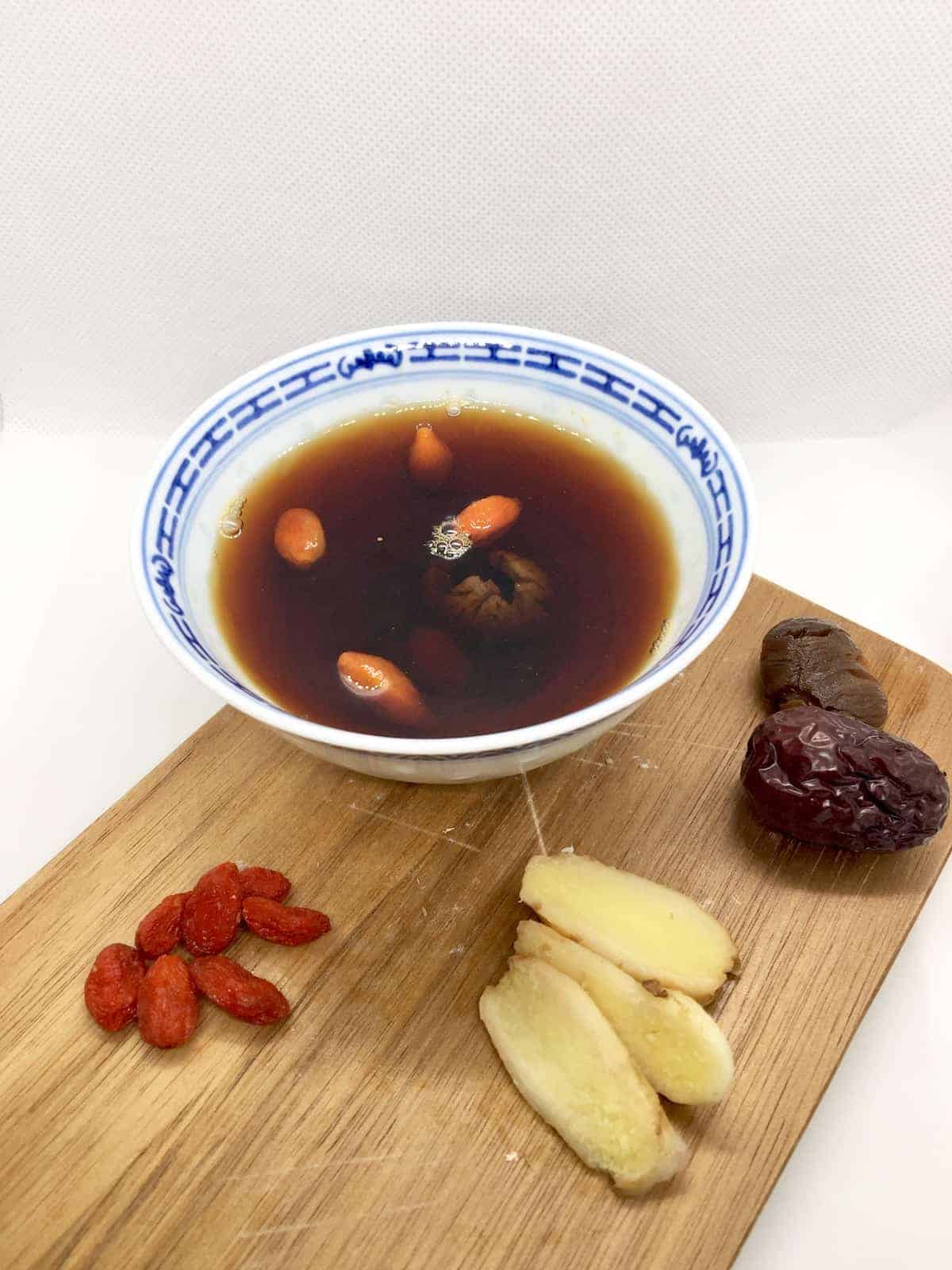
You only need 2 simple ingredients for the basic recipe:
- Chinese red dates: You can get these dried dates at the Chinese grocery store or Asian markets. They last for a long time if store away from direct sunlight in a cool place. Alternatively, you can find the pre-made Korean jujube syrup (cheong) at Korean supermarkets. (Check the ingredient list as commerically-made Korean tea often contains a ton of added sweetener and preservatives.)
- Water
However, you can make many different teas by adding 1 or more ingredients, such as:
- Fresh Ginger
- Cinnamon stick
- Goji berries
- Other dried fruit: usually dried longans
- Red ginseng
- Honey, rock sugar or brown sugar: brown sugar is common when making this for women but note that jujubes have a naturally sweet taste (amplified if you add the cinnamon bark, goji berries and/or longan)
- Pine nut kernels: dry fry and sprinkle on top of each glass of tea, (this is how the drink is served in many places in Korea.)
Step-by-step Instructions
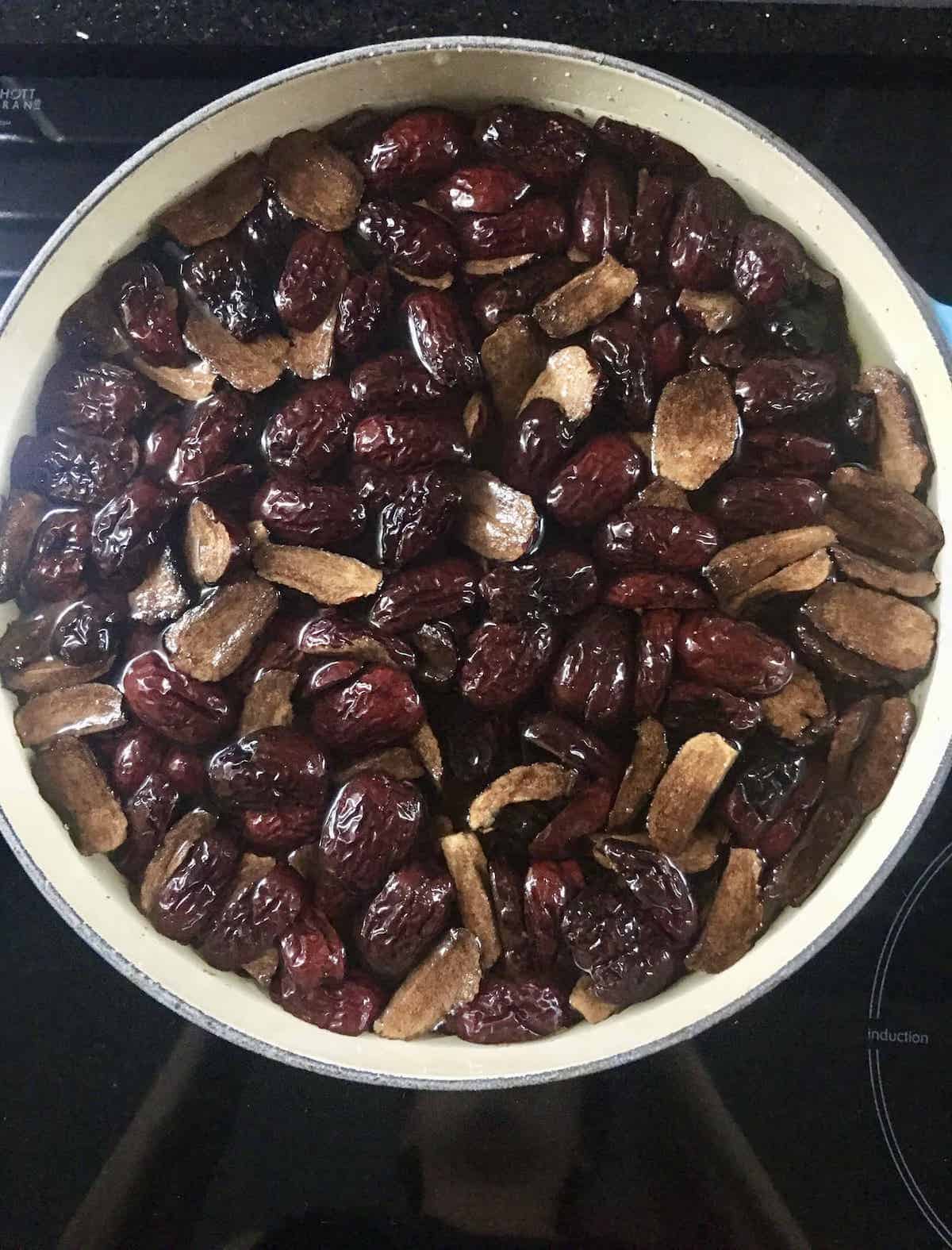
- Add the red Chinese dates, water and any other ingredients you want to add to the tea to a huge pot.
- Bring to the boil then lower to a simmer for at least 1 hour.
- Sieve the skins and seeds out whilst pressing the pulp back into the pot. Stir well and simmer for another 30 minutes-1 hour.
Note: if adding wolf berries, add them 30 minutes before you turn off the stove as they're a more fragile ingredient.
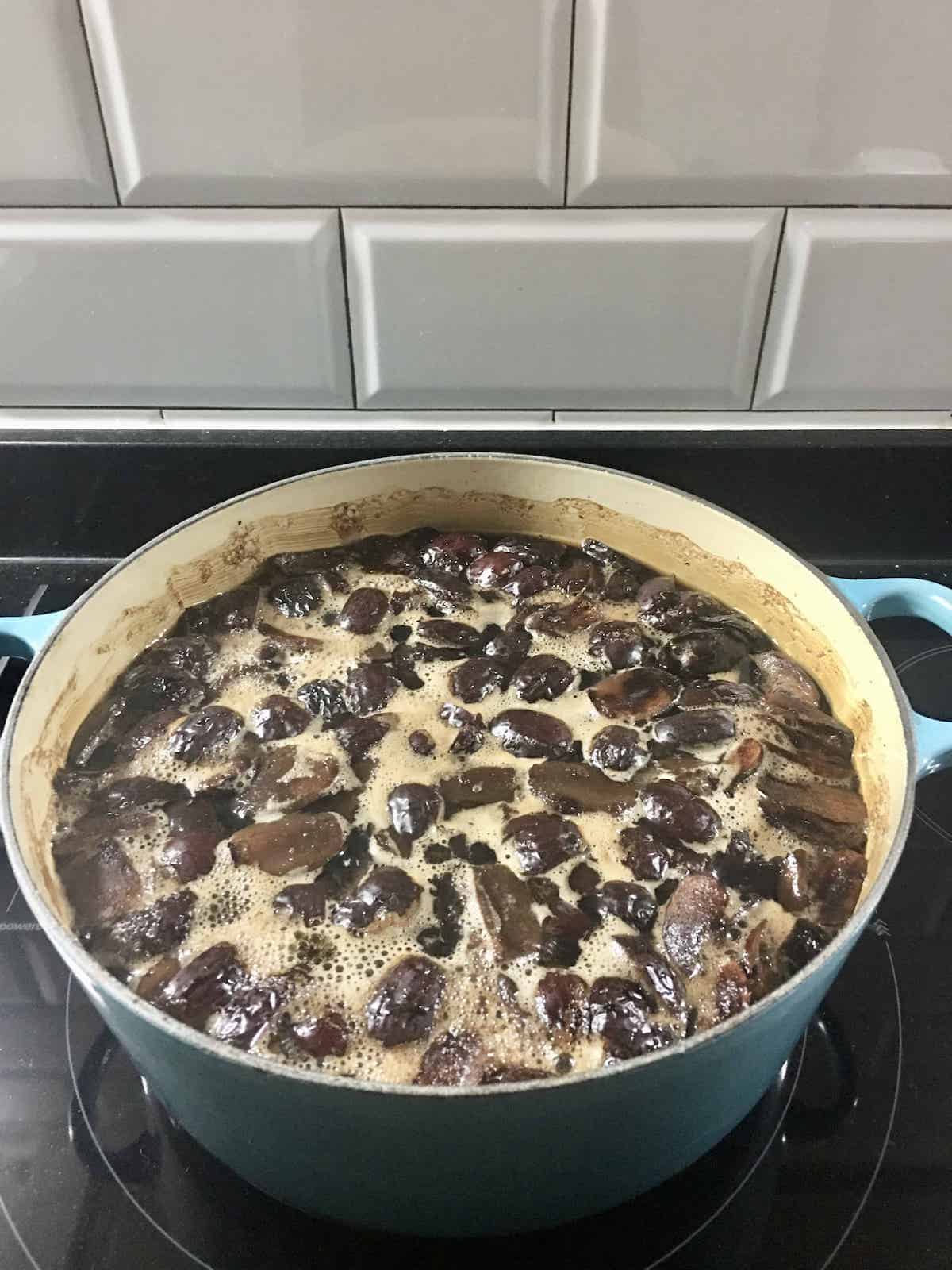
Note 2: Use a large pot so you can make a bigger batch of this herbal tea- you've already turned the stove on and it keeps for a few days in the fridge after all.
Note 2: When the red dates are boiling, you may find white powder or bubbles forming, which you can skim off or leave (they will eventually disappear.)
It's nothing to worry about as it seems to be because of the saponin or sugar in the jujube.
How to Serve
Dry fry some pine nuts and sprinkle them on the tea (they'll float on the surface.) The jujube tea can be drunk hot or cold.
In winter, it's so warm and comforting to drink jujube tea and snack on some hotteok (Korean pancakes.)
How to Store
You can make a big batch of jujube ginger tea and store in the fridge in an air-tight container for up to 3-5 days.
To make Korean Daechu Cha concentrate
If you want to make a week's worth of tea, make a more concentrated jujube syrup.
To do this, you simmer the dried dates for a minimum of 8 hours till it forms a thick, syrupy paste. Keep the red datesyrup in the fridge. (You can cook it in the slow cooker or pressure cooker.)
Scoop out a few spoonfuls of the jujube cheong and dilute with hot water whenever you want to drink red date tea.
Expert Tips
Tip #1: As pure jujube tea only has 2 main ingredients (water and red dates- everything else is optional), use the best jujubes that you can get.
Tip #2: When using red dates, we are told to remove the jujube seed before cooking, if not they'll be very heaty (and you'll be more likely to develop a sore throat, fever or acne, which no one wants!) I know some people don't though. If you choose not to core them, do use the kitchen scissor to make a deep cut or 2 in the fruit to help the flavour develop better.
Tip #3: Although the jujube peel is tougher, you may want to eat it and the pulp after sieving it out- they contain a lot of nutrients!
Recipe FAQs
Chinese people have long extolled the health benefits of jujubes or red dates, and scientific research has also shown findings that support these claims, citing the antiviral, anticancer, anti-obesity etc effects of th fruit. For a link to the research papers, as well as more information on the health benefits, please see the "Health Benefits" section.
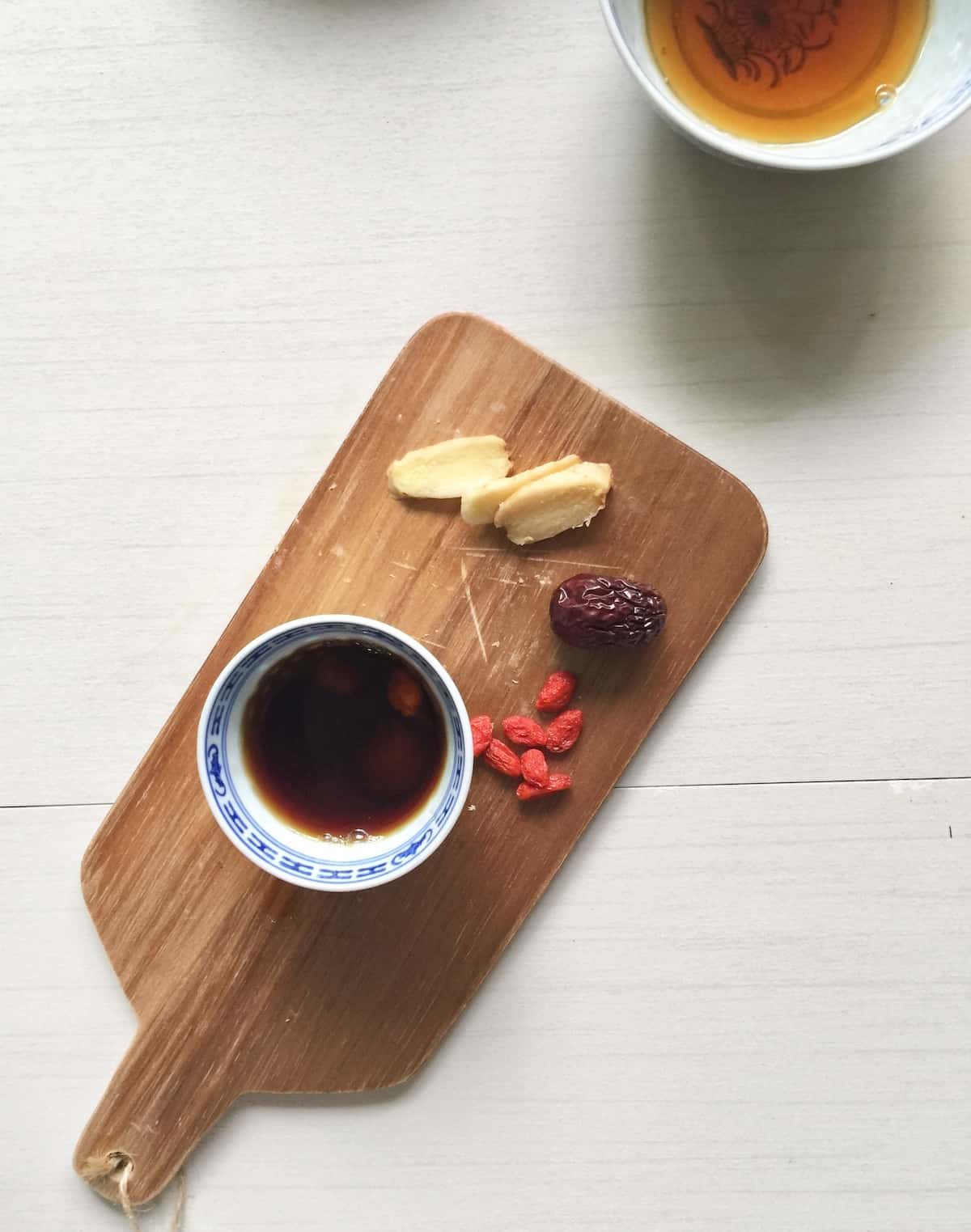
Other Asian Teas
These are some of my most popular Asian drink recipes:
Enjoyed this Chinese Date Tea Recipe? Please leave a 5-star 🌟🌟🌟🌟🌟rating in the recipe card below & if you REALLY found this women's tea recipe useful, a comment would make my week! Thank you and have a great day!
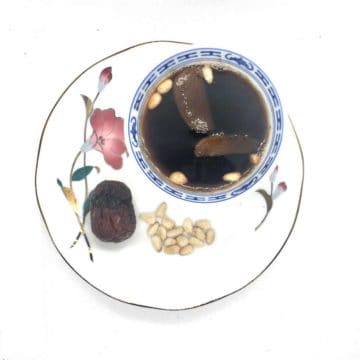
Chinese jujube tea with ginger (Red date tea)
Equipment
- Large pot I used my Le Creuset Dutch oven and it was almost overflowing- if your pot is smaller, just add as much water as you can without the tea spilling over then top up later if necessary.
- sieve
Ingredients
- 4 Cups jujubes, rinsed Make a few slashes in each to release the flavour. Best if you want to remove the seed as it supposedly makes the tea very heaty but it's not 100% necessary.
- 18 Cup Water
- Few slices ginger Omit if not a fan of ginger
- 1 cinnamon stick, optional
- Brown sugar, rock sugar or honey, optional For those with very sweet teeth
- Goji berries, dried longans, red ginseng. Other optional ingredients
- Dry toasted pine nuts, optional For sprinkling on the tea
Instructions
- Add the jujubes and water to a pot and bring to the boil. Note: If using cinnamon, ginseng, ginger etc, add them now too.
- Lower to a simmer and leave for a minimum of 1 hour or till the jujubes are soft and plump, stirring every now and then.
- Sieve the skins and seeds out whilst pressing the pulp back into the jujube tea. Stir well and simmer for another 30 minutes-1 hour. (I usually cook for 2- 2.5 hours in total till the flesh is pretty much breaking apart.) Discard the seeds- the skins contain nutrients so I'll let you decide whether to eat them or not as they're quite fibrous.Note: if using wolfberries, add them 30 minutes before you turn off the fire.
- Switch off the fire, remove the cinnamon and ginger (if using- they can be tossed) then taste. If not sweet enough for you, season to taste with brown sugar, rock sugar or honey.
- Ladle into cups, and garnish with toasted pine nuts if you have them.
Notes
Note: the nutritional information is an estimate automatically calculated using the WPRM recipe maker and I am not responsible for its veracity.
Nutrition
If you've found this traditional Chinese tea recipe useful, maybe you'd like to sign up for my Asian recipes' newsletter?

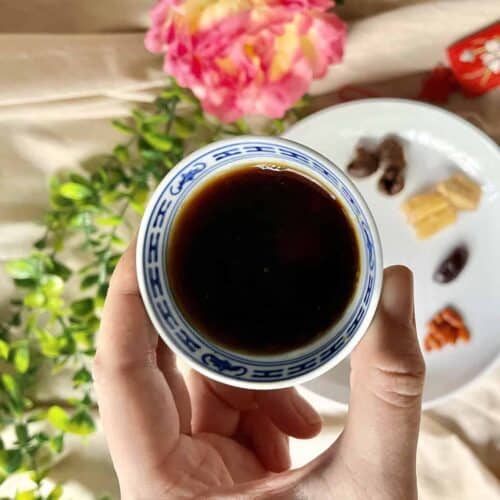
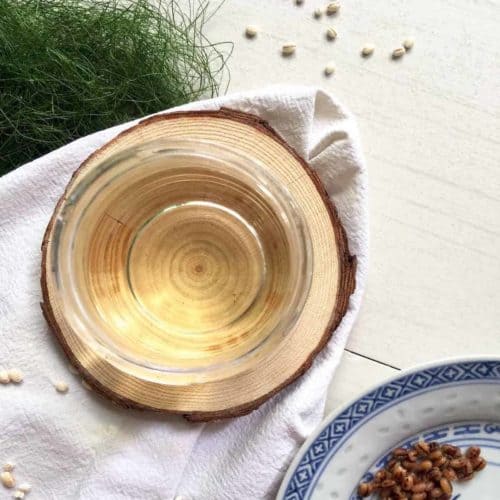
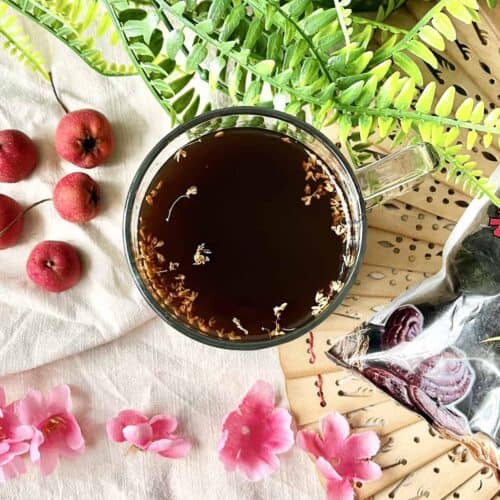
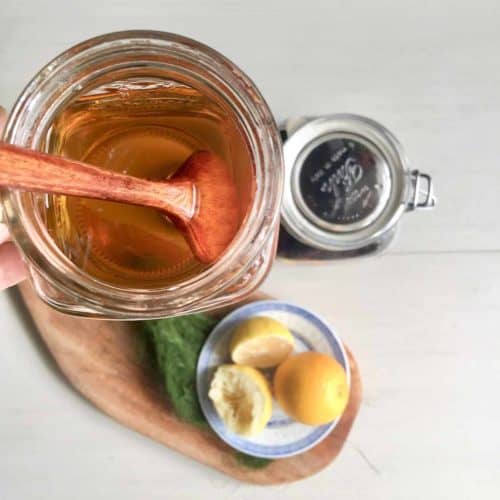
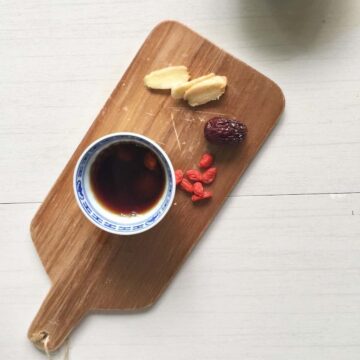
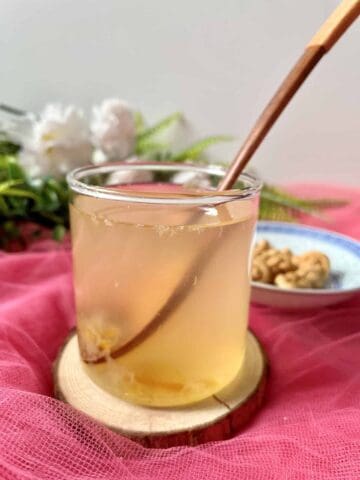
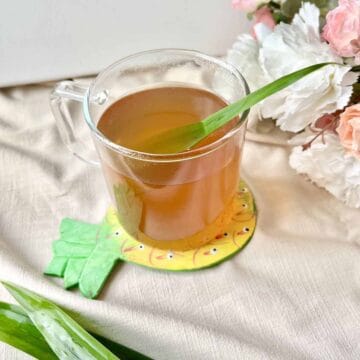
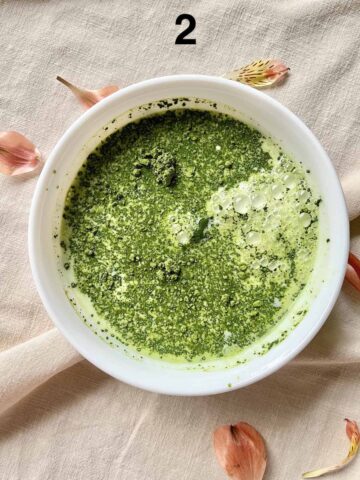
Mera says
Made this today and it was so warming when it was cold out!